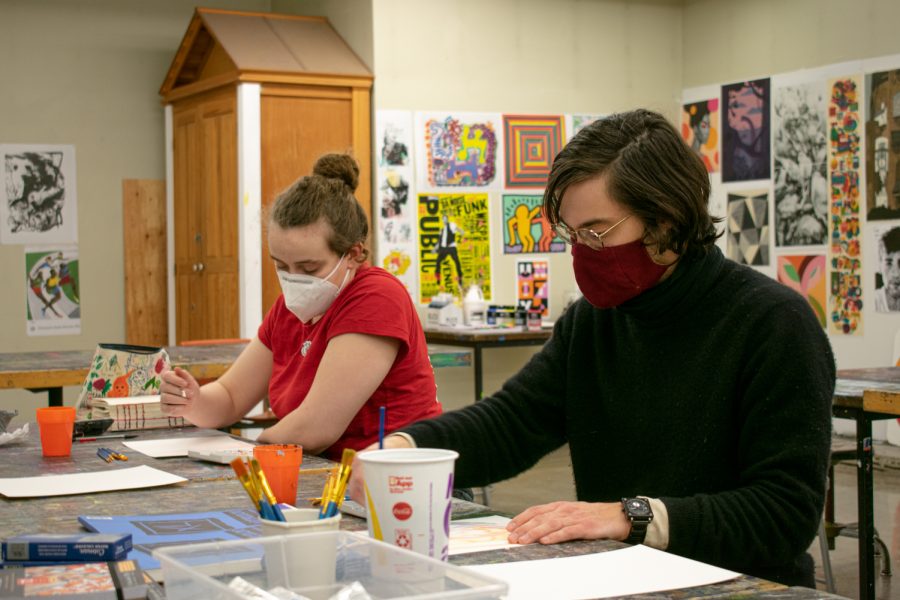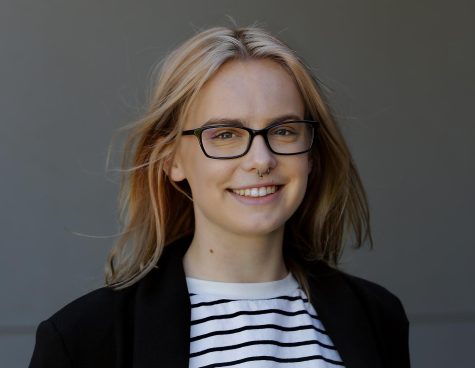Cougs for Recovery allows students to find recovery-education balance
Supports students through recovery, being sober
Junior computer science major Cora Hernandez (left) and junior digital technology and culture major Austin Wetzel create watercolor paintings at Cougs for Recovery’s weekly Art Night, Friday, Jan. 28, at the Fine Arts Center.
November 17, 2022
Cougs for Recovery is a harm reduction recovery program under Health Promotion where students can meet and come together to discuss sobriety and recovery issues.
Recovery coach Jennifer Madison said the program creates a safe space both on campus and through the global community where students are not subjected to drugs and alcohol.
“It’s an open environment to have fun and not have to be exposed to [those],” Madison said.
Madison is in long-term recovery and came to WSU in 2021 as a homeless person with just a cup of coffee, a blanket and an internet connection; she came as a postback pursuing her second degree.
She ended up stumbling across C4R at a virtual student involvement fair when they were a small, online-only program, she said.
“We are now 170 strong, of a community of people who are allies to recovery as well as people in various degrees of recovery,” Madison said.
Being in C4R has given Madison something to do with a good community surrounding her, she said.
“It gave me … people that understand what it’s like to balance recovery with education,” she said. “Sometimes the stresses of the lifestyle of being a student can wear [people out], especially with the majority of people that are on campus that party, finding safe spaces to exist and have fun … that was a little harder to find before.”
As a recovery coach, Madison loves being able to create a community and opportunities for people, she said.
“I work with students … one on one to give them some tools that they may not have had before,” she said.
Madison said C4R holds well-being planning sessions Friday afternoons that are open to all students at WSU, both on the physical campuses and through the Global Campus.
In these meetings, Madison uses the SMART objective: specific, measurable, achievable, relevant and time bound goals she said.
“It’s been really neat to work with both allies as well as people in the various degrees of recovery because it gives them goal-setting tools,” she said. “For me, that’s been the coolest thing, just working individually with students and then when they recognize that they’re not alone in this process and that the university has been finding that recovery, that’s amazing.”
Recovery coach Shabda Stinebaugh said C4R has yoga sessions now, as well as art nights.
Stinebaugh said after being involved in the program, she decided to become a recovery coach because of her personal history of substance abuse disorder.
“I’m a person in recovery, and I am sober, that’s my choice,” she said. “[This] is a way to connect to other people, which helps in my healing; … it helps me in my ability to live my best life.”
As a recovery coach, Stinebaugh finds herself learning more about herself by helping other people.
“A lot of the best things in recovery for me has been the connection to other people and having things in common with other people is obviously something that we’re all looking for,” she said.
Stinebaugh said just because someone is in recovery or chooses to be sober does not mean they do not have fun.
“All the things I used to enjoy, I still do,” she said. “I still do all the fun things. I feel like I have more fun now.”
Recovery coach Nicole Williams said she has a long history with Substance Abuse Disorder; recovery from alcohol and drugs are a huge part of her story.
When her children, 26 and 27, grew up, she decided to go back to school, Williams said. She came to WSU, and came across C4R
“It’s the perfect combination for me, and it’s really exciting to find other students that are in recovery,” she said.
Williams said a big part of her recovery is giving back to people that are still struggling or are in long-term recovery.

















Jennifer • Nov 18, 2022 at 1:33 pm
Correction: Recovery coach Jennifer Madison said the program creates a safe space both on campus and through the global community where students are NOT subjected to drugs and alcohol.
Managing Editor • Nov 19, 2022 at 1:17 pm
Thank you, we have corrected the error.
Jennifer • Nov 20, 2022 at 2:16 pm
Thank you.